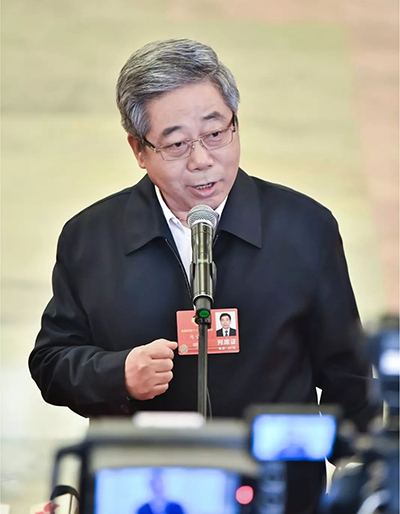
Chen Baosheng, Minister of Education, is taking questions from journalists.[Photo/Li Xin from Xinhua]
On the afternoon of 3 March, the “Ministers Corridor”, also known as “the Ministers Red Carpet”, opened to the media following the first annual session of the 13th National Committee of the Chinese People’s Political Consultative Conference (CPPCC) in the area near the northern gate of the Great Hall of the People. Among the officials from various Chinese government agencies speaking in this location, Chen Baosheng, Minister of Education, was the first to take questions from journalists. He answered questions on two focal topics: the development of the teaching workforce and the length of the school day.
I. On teacher workforce development
Minister Chen applauded the Opinions of the CPC Central Committee and the State Council on Deepening the Development and Reform of the Teaching Workforce in a New Era and highlighted three of its key merits: “Above all, this is the very first official document on the development of education in the new era since the 19th CPC National Congress. It maps out the path for the modernization of education, the education-driven national development, and building an education system that will meet the expectation of the people.” “Second, the document systematically solves major theoretical and practical issues that need to be addressed to further develop out teaching body for the new era. And third, it opens a new chapter in the development and reform of the teaching workforce for the new era, through systematic and comprehensive policy measures geared to tackle pivotal issues. In sum, this document sets out an innovative model for education.”
Chen added that full implementation of the document will be achieved through the completion of six central tasks: 1) The relative social status and financial position of teachers should be raised in line with other jobs. 2) Management regulations and mechanisms should be reformed to optimize school facilities, achieve rational student-teacher ratios, and build a better-educated teacher workforce. 3) Teacher education should be strengthened while the current body of teachers should receive further training. 4) More and better opportunities should be offered to teachers for their professional growth and career development. 5) The legitimate rights and benefits of teachers should be protected by securing the required funding. 6) Teachers should receive the high level of public respect they deserve and feel happy in their working environment.
II. On the issue of the school day
The after-school “pick-up rush hour” at 3:30 pm is symptomatic of China having reached the present stage of socio-economic and educational development. It is an issue however that has become a source of public concern and individual anguish. Chen stated that, “This is a problem that mainly affects medium- to large-sized cities, where all compulsory education schools finish at the same time: 3:30 pm. The inconvenience of this time for working parents to pick-up their children has become apparent. This is compounded by the fact that young parents affected by this problem are often at a critical point in both their career and family life.”
The MOE is attaching great importance to this issue and in February 2017 released a circular aimed at resolving the problem. After one year of efforts, progress has been made: 25 provinces have developed specific policies and measures suited to local conditions and identified several feasible, appropriate solutions. For instance, all schools in Shanghai provide after-school (late exit) services between 3:30 pm and 5:00 pm. Schools in Beijing organize extra-curricular activities for students between 3:30-5:00 pm. In Nanjing, parents have the option to apply for after-school services which are coordinated and monitored by the school. A fourth solution launched by schools in Guangxi, relies on community resources to bridge the after-school time gap.
Chen said that, the MOE will identify and promote successful measures and work with relevant parties on the regulatory and policy difficulties, such as how to compensate teachers who work overtime to provide after-school services and how to apportion resulting additional costs. He cautioned against the boom in out-of-school tutoring classes, whilst noting nonetheless the need to find and implement sensible suggestions and alternatives to overcome this problem.



